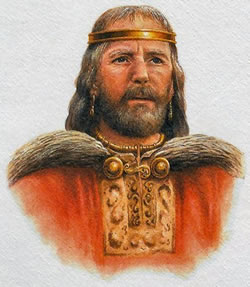Words for king and related things in Celtic languages.

Brian Boru, High King of Ireland (1002-1014) / Brian Bóruma mac Cennétig, Ard-Rí ar Éirinn
| Proto-Celtic |
*rīxs/*rig- = king |
| Celtiberian |
reikis = king |
| Gaulish |
rīx = king – appears in names like Katurīx, Suādurīx, *Werkingetorīx (Vercingetorix) and Asterix |
| Primitive Irish |
ᚏᚔᚌᚐᚄ (rigas) = (of the) king |
| Old Irish (Goídelc) |
rí [r͈ʲiː] = king
rígdae = regal, kingly
rígdún = palace |
| Middle Irish (Gaoidhealg) |
rí, ríg, rig = king, head, chief
rígán = a sub-king, chief
rígamail, rioghamhail = royal
rígdacht = kingliness, kingly qualities, a kingdom
rígda(e) = a royal dwelling place, palace
rígrach = = royal, kingly |
| Irish (Gaeilge) |
rí [ɾˠiː] = king, sovereign, monarch
ríoga = regal, royal
ríora = kings, royal persons, royalty, dynasty |
| Scottish Gaelic (Gàidhlig) |
rìgh [r̪ʲiː] = king
banrìgh = queen
àrd-rìgh = high king
mòr-rìgh = emperor
rìoghachadh = reigning, reign
rìoghachd = kingdom, realm |
| Manx (Gaelg) |
ree = king
reejerey = cavalier, chevalier, king, knight, lord, paladin, prince
reeoil = kinglike, monarchy, regal, royal
reeaght, reeriaght, riaght, ream = kingdom |
| Proto-Brythonic |
*riɣ [ˈriːɣ] = king |
| Old Welsh |
rig = king |
| Middle Welsh (Kymraec) |
ri, rhi = king
rhiaidd, rhïaidd = regal, royal, noble, generous
rieu, riav = king, lord, ruler, chieftain
rriawdr, riawdr = lord, ruler, chieftain, God |
| Welsh (Cymraeg) |
rhi [r̥iː] = king, prince, lord, ruler, chieftain
rhiaidd = regal, noble, aristocratic, dignified
rhiau = king, lord, ruler, chieftain
rhiawdr = lord, ruler, chieftain, God |
| Middle Cornish (Cernewec) |
ruy, ruif = king, sovereign, ruler
ryal, real = royal, kingly |
| Cornish (Kernewek) |
riel = regal, royal |
| Old Breton |
ri = king |
| Middle Breton (Brezonec) |
ri, rí = king |
Etymology: from Proto-Indo-European *h₃rḗǵs (king, ruler) [source], which is also the root of the German word Reich (empire, realm), and the English suffix -ric, as in bishopric (a diocese or region of a church which a bishop governs) [source].
| Proto-Celtic |
*rīganī= queen |
| Gaulish |
rigani = queen |
| Old Irish (Goídelc) |
rígan = queen |
| Middle Irish (Gaoidhealg) |
rígain, rígan, rígnae = queen, noble lady |
| Irish (Gaeilge) |
ríon = queen, queenly, noble, lady, fair maiden
banríon = queen
(ban)ríonacht = queenship
ríonaí = queenly
ríonaigh = to queen (chess) |
| Scottish Gaelic (Gàidhlig) |
rìghinn [r̪ʲi.ɪn̪ʲ] = princess (archaic)
rìbhinn [r̪ʲiːvɪn̪ʲ] = maid, maiden, girl, Venus, adder, queen (archaic)
banrìgh = queen |
| Manx (Gaelg) |
reeven = queen
rein = queen
ben-rein = queen |
| Proto-Brythonic |
*rriɣėn [r͈iˈɣe̝ːn] = queen |
| Middle Welsh (Kymraec) |
riein, riain = (young) woman, girl, damsel, lass, maiden, virgin, queen, noble girl, lady |
| Welsh (Cymraeg) |
rhiain = (young) woman, girl, damsel, lass, maiden, virgin, queen, noble girl, lady |
Etymology: from Proto-Indo-European *h₃rḗǵnih₂ (queen), from *h₃rḗǵs (king, ruler) [source]. Words from the same roots include reine (queen) in French, reina (queen) in Spanish, erregina (queen) in Basque, and regină (queen) in Romanian [source].
| Middle Welsh (Kymraec) |
rhỼyf, rwyf, rỼy = king, lord, ruler, chieftain, leader
rwyfaỼ, rwyfaỼ = to have dominion over, govern, rule
rwyuannus, rhwyvanus = royal, kinglike, governing
ruyvenit = prince, king, ruler
rhwyfiadur, ruyfadur, rwyfyadur, rỼyfyadur = chief(tain), lord, leader, ruler, protector |
| Welsh (Cymraeg) |
rhwy(f) = king, lord, ruler, chieftain, leader
rhwyfo = to have dominion over, govern, rule, lead, be ostentatious, live in splendour
rhwyfanes = queen, lady
rhwyfaniad = reign, government, rule, kingdom
rhwyfanus = royal, kinglike, governing
rhwyfenydd = prince, king, ruler
rhwyf(i)adur = chief(tain), lord, leader, ruler, protector |
| Old Cornish |
ruifanes = queen
ruifadur = chief(tain), lord, leader |
| Middle Cornish (Cernewec) |
ruy, ruif = king, sovereign, ruler
ruifanes, ruivanes = a female ruler, queen |
| Cornish (Kernewek) |
ruvanes = queen
ruvaneth = kingdom |
| Old Breton |
roe = king |
| Middle Breton (Brezonec) |
roe, roé, roue, rouè = king
rouanes, roanez, rouanés = queen
rouantelez, roeantelez = kingdom
roueel = royal
roueeler = royalist
roueelezh = royalty
roueelouriezh = royalism
roueoni = reign |
| Breton (Brezhoneg) |
roue = king
rouanez = queen
rouantelezh = kingdom, monarchy
roueel = royal
roueelezh = royalty
roueelouriezh = royalism |
Etymology: from Old French roi (king), from Latin rēgem (king, ruler, despot, tyrant), from Proto-Italic *rēks (king), from Proto-Indo-European *h₃rḗǵs (king, ruler) [source].
Words from the same Latin root include re (king) in Italian, roi (king) in French, viceroy in English and rey (king) in Spanish [source].
| Proto-Celtic |
*brigantīnos = (someone) pre-eminent, outstanding |
| Proto-Brythonic |
*brɨɣėntin [brɨɣe̝nˈtiːn] = lord, king |
| Middle Welsh (Kymraec) |
breenhin, breennin, breyenhin, brenhin = king
brenhynes, brenhines = queen, goddess, queen bee
brenineiziaw = to become kingly
brenhynyaeth, brenhinyaeth = royalty, kingship, reign |
| Welsh (Cymraeg) |
brenin [ˈbrɛnɪn / ˈbreːnɪn] = king, sovereign, monarch, head of region
brenineiddio = to make/become regal/kingly, make (sb) a king
breninesaidd = queen-like, queenly
breninesol = queen-like, queenly, pertaining to a queen
breningarol = royalist
breniniaethu = to reign, govern
breninoldeb = kingship, royalty
brenhines = queen, goddess, queen bee
brenhiniaeth = royalty, kingship, reign, government |
| Middle Cornish (Cernewec) |
brentyn, bryntyn = privileged, sovereign, noble, excellent |
| Cornish (KerneweK) |
bryntin, brentin = grand, great, noble, splendid, superb |
| Old Breton |
brientin, brientinion = king |
| Middle Breton (Brezonec) |
brientin = aristocrat
brientinelezh = aristocracy |
| Breton (Brezhoneg) |
brientin = aristocrat
brientinel = aristocratic
brientinelezh = aristocracy
brienteg, brientek = privileged
brientekaat = to favour
briental = royalties |
Etymology: from Proto-Indo-European *bʰérǵʰonts (high), from *bʰerǵʰ- (to rise up, ascend) [source].
From the same Proto-Celtic root, , we get the tribal name *Brigantī (Brigantes – a Celtic tribe that occupied much of what is now northern England), Brigantia (a Celtic goddess of victory, and the territory of the Brigantes), the name Bridget, the Irish name Bríd, the Scottish Gaelic name Brìghde, the Manx name Breeshey, and the placenames such as Bragança (a city in northeastern Portugal), Bregenz (a city in western Austria) and Brianza (a city in northern Italy), [source].
English words from the same PIE root include bourgeois, burrow, fort and maybe burgler [source].
| Middle Welsh (Kymraec) |
mechdeyrn, mychdeyrn, machdeyrn = king, lord, monarch, emperor
mechteyrnged, mychteyrnged = tribute due to an overlord from an inferior lord |
| Welsh (Cymraeg) |
mechdeyrn, mychdeyrn, machdeyrn = king, lord, monarch, emperor, God, tributary prince, viceroy
mechdeyrnged, mychdeyrnged = tribute due to an overlord from an inferior lord |
| Middle Cornish (Cernewec) |
mychtern = sovereign, king
mychternes = queen
mychterneth = sovereignity, dominion, royalty, kingdom |
| Cornish (Kernewek) |
myghtern, metern [mɪx’tɛrn] = king, monarch
myghternes, meternes = monarch, queen
myghterneth, meterneth = kingdom
myghternses, meternses = kingship, monarchy |
| Old Breton |
machtiern = king |
Etymology: from Welsh mach (surety, guarantor, sponsor, hostage) and teyrn (sovereign, monarch, king) [source].
Source: Gerlyver Kernewek, Geiriadur Prifysgol Cymru
Words marked with a * are reconstructions.
Sources: Wiktionary, Am Faclair Beag, Online Manx Dictionary, Teanglann.ie, eDIL – Electronic Dictionary of the Irish Language, In Dúil Bélrai English – Old Irish glossary, Geiriadur Prifysgol Cymru, Gerlyver Kernewek, Dictionaire Favereau, TermOfis, English – ProtoCeltic WordList (PDF), Etymological Dictionary Of Proto Celtic




